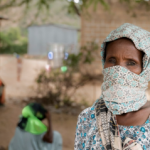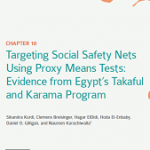IFPRI-Egypt is seeking to hire a survey firm to work as a Consultant for Takaful and Karama Round 2 Evaluation.
Application Deadline: April 9, 2021
NEW PUBLICATION: Ethiopia’s social safety net effective in limiting COVID-19 impacts on rural food insecurity
By Kibrom A. Abay, Guush Berhane, John Hoddinott, and Kibrom Tafere
Multiple studies have documented the negative impacts of COVID-19 on the poor and vulnerable. Over the past decade, rigorous evaluations have shown Ethiopia’s Productive Safety Net Program (PSNP) yielding positive results in addressing household poverty and food insecurity in the low-income districts it targets. As the pandemic suddenly raised economic stresses on poor households, a new study by Kibrom Abay, Guush Berhane, John Hoddinott, and Kibrom Tefere shows the PSNP has been [...]
Publication: Targeting Social Safety Nets Using Proxy Means Tests: Evidence from Egypt’s Takaful and Karama Program
Sikandra Kurdi, Clemens Breisinger, Hagar ElDidi, Hoda El-Enbaby, Daniel O. Gilligan, and Naureen Karachiwalla
This chapter from ReSAKSS Annual Trends and Outlook Report (2017-2018) uses Egypt as a case study to examine the effectiveness of proxy means test (PMT) targeting. Targeting effectiveness is defined in terms of the ability of the program to enroll beneficiaries from the lowest two quintiles of the expenditure distribution.
How Egypt helps the food insecure
May 04, 2016 By: Racha Ramadan, Assistant professor at Faculty of Economics and Political Science- Cairo University Share URL As a Low Income Food Deficit Country (LIFDC), food security is an important challenge for Egypt, with 17.2% of the Egyptians suffering from food insecurity in 2011 and 5% undernourished during the period from 2008 to 2015 Egypt suffers from […]



